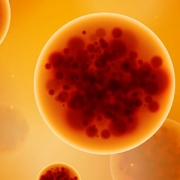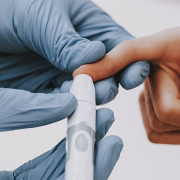The impact of Covid-19 on rare disease communities
Guest author Dr Christine Patch explains the challenges in supporting patients with rare disease during the pandemic, as well as the opportunities that may arise
Among current initiatives to combat Covid-19, genomics is achieving a high profile. It is clear it will be a crucial component in the efforts to understand, manage and hopefully ameliorate the consequences of the pandemic. This is truly an example of the power and relevance of genomic medicine, writes Dr Christine Patch.
We have seen this power in action for some time within clinical genetics research and practice. But will the Covid-19 pandemic response, with its emphasis on genomics, help or hinder progress for patients with rare disease and their families?
Meeting patients’ needs
Projects such as the UK’s 100,000 Genomes Project have raised the profile of applying genomic science to families with rare disease: shortening the diagnostic odyssey, raising the potential of new therapeutics, and providing information that contributes to potential options for the future.
In this optimism and excitement, however, we must not forget that the diagnosis is just the start of another phase of the patient and family journey. We know that rare disease charities and advocacy groups are already asking the question: what happens next?
Currently, and quite rightly, the priority of our health service is to manage the consequences of this pandemic; genomic science, where relevant, contributes to that. However, it is also important to not lose sight of the health and social care needs of families with rare disease, who may be disproportionately affected owing to compromised health and the need to continue with healthcare intervention.
Understanding rare disease
In the UK, around 3.5m people are living with a rare disease. Around 80% of rare diseases are genetic in origin, with more than half presenting at birth or during childhood. Many of these conditions are severe, lifelong and may be life threatening. Patients and families present with complex multi-system health and social care needs, and there can be a significant impact on quality of life for both them and their caregivers.
The effects on quality of life for patients, as well as their families and caregivers, are compounded by delayed or incorrect diagnoses, limited or no access to appropriate treatment and poor co-ordination of care within the healthcare system.
Moreover, the Covid outbreak, and the healthcare system’s unprecedented response to it, brings with it new challenges for these patients and their families.
The Covid-19 effect
The emergence of the new virus has raised the profile of genomic healthcare in its totality. It has highlighted the importance of mobilising research into prevention and treatment, and the necessity of establishing large data sets (with appropriate governance and consent) for understanding the natural history of the virus and its transmission.
There is anxiety, however, that both Covid-19 itself and the policies designed to combat it may disproportionately affect individuals with rare disease and their families. This relates not only to conditions where an individual is at increased risk of complications from infection, but also to problems with the accessibility of necessary health and social care services, putting patients, families and carers under greater strain.
In response to this, professional societies and patient support groups, such as the British Society for Genomic Medicine, the Rare Chromosome Support Group (Unique) and Genetic Alliance UK, are actively advocating for, and providing information and support to, individuals affected by rare disease and their families.
The evolution of healthcare
As well as the many difficulties created by the current outbreak, there may be positives that arise from this for patients and families affected by rare disease. Initiatives investigating and managing the consequences of the pandemic are learning from – and building on – past investment in genomic science and its implementation in healthcare. In the same way, it is possible that learning from the pandemic response will feed back into the application of genomic medicine to the care, management and treatment of inherited rare disease.
These new insights and advances have the potential to bring forward ambitions to achieve earlier diagnosis, co-ordinated care, early interventions and potential treatments, driven by active collaborative research in partnership with the rare disease community.
An integral part of this are the healthcare professionals who are at the frontline of delivering genomic medicine: from managing infectious disease to the care and support of an individual with a rare disease and their family. They will need to continue to develop relevant skills and knowledge to deliver competent and clinically appropriate care. 100,000 Genomes Project participant Leanne LeRiche highlights how important frontline health workers are in integrating this new genomics-based knowledge.
And, of course, the importance of the rare disease community must not be forgotten. They have already participated actively in genomic research and, along with participants in initiatives such as UK Biobank, their data will contribute to advancing knowledge about Covid-19. It is essential that this contribution is recognised, and that the knowledge generated is used to contribute to rare disease communities, working with them in partnership to provide holistic patient and family-centred care.
Dr Christine Patch is clinical lead for genetic counselling at Genomics England, and principal staff scientist in genomic counselling at the Wellcome Genome Campus’s Society and Ethics Research Group.
–
Please note: This article is for informational or educational purposes, and does not substitute professional medical advice.=









